When it comes to cookware, I know there’s a lot of debate about which materials are best to use in the kitchen. One of the most common questions I come across is whether or not aluminum cookware is bad for our health.
In my research, I’ve learned that aluminum is a popular choice for cookware because it’s lightweight, inexpensive, and conducts heat well. However, I’ve also discovered that there are some concerns over its safety when used for cooking, especially when it comes to its potential to leach into food, particularly acidic food. This can cause a metallic taste and even impact the cookware surface.
To better understand the potential health risks, I looked into various sources that discuss aluminum cookware and its safety. While some believe that uncoated aluminum is unsafe and has been associated with Alzheimer’s disease, others argue that the amount of aluminum absorbed from cooking is minimal and not harmful. Knowing this, I wanted to explore the topic further and provide more detailed information on aluminum cookware and its potential effects on our health.
The Debate Over Aluminum Cookware
I recently found that there are two sides to the debate over aluminum cookware. Some believe it is safe, while others worry about its potential health risks. Let me share what I’ve learned about this topic to help you understand the differing opinions.
One concern about aluminum cookware is the possibility of aluminum leaching into food during cooking. Research, like the one mentioned in Cook’s Illustrated, has shown that cooking in uncoated aluminum can cause the metal to leach into food. Many people are worried because the long-term health effects of consuming aluminum are not entirely known.
However, I discovered that there are different types of aluminum cookware. Anodized aluminum cookware, as mentioned in Rob Brown MD, has a thin layer of aluminum oxide on the surface. This layer makes it more durable and less likely to flake off or corrode, which could reduce the chances of aluminum leaching into food. Anodized cookware conducts heat quickly and is nonstick and scratch-resistant.
Some people associate aluminum exposure with health risks like Alzheimer’s disease, as noted by The Rational Kitchen. But it’s crucial to consider that aluminum is the third most abundant element on Earth and is found in many everyday items, not just cookware.
In summary, the debate on aluminum cookware safety has its roots in the potential for aluminum to leach into your food and the unknown long-term health effects of aluminum consumption. While different types of cookware like anodized aluminum may be safer than uncoated aluminum, it’s important to stay informed and make the best choices for your kitchen needs.

Potential Health Risks
Let’s discuss a few potential health risks related to using aluminum cookware. This section will focus on aluminum leaching and the link between aluminum and Alzheimer’s disease.
Aluminum Leaching
When cooking with aluminum pots and pans, it is possible that a tiny amount of the metal can leach into the food. This can be affected by the type of food, with acidic or wet foods causing more aluminum to enter the food than dry or non-acidic ingredients. Cook’s Illustrated recommends minimizing the intake of aluminum if possible, especially when cooking with uncoated aluminum cookware.
However, Livestrong states that the amount of aluminum that enters our body through cooking with aluminum cookware is very small, and it is not harmful. The ATSDR (Agency for Toxic Substances and Disease Registry) suggests that people absorb only 0.01 to 5 percent of the ingested aluminum.
Alzheimer’s Disease
There have been concerns about the link between aluminum exposure and the development of Alzheimer’s disease. While it is true that some studies have found a relationship between aluminum and Alzheimer’s, USA Today states that aluminum-related health issues come from exposure to high levels of aluminum, not the small amount ingested through food (a typical adult ingests 7-9 milligrams of aluminum each day).
In conclusion, it is essential to remember that while there are some potential risks associated with using aluminum cookware, using it in moderation and while taking necessary precautions can minimize these risks.
Understanding Aluminum Exposure
One factor that increases aluminum leaching is the use of high heat when cooking. Acidic foods, like tomatoes or citrus, can also cause an increased amount of aluminum to leach into the food. This will be most noticeable with bare aluminum cookware. To reduce my exposure to aluminum, I can use coated cookware. For example, coating cookware has been shown to reduce aluminum exposure by more than 98%.
It’s important to know that aluminum exposure from cookware is not the only source. Some foods have naturally higher levels of aluminum, such as leafy greens that have absorbed aluminum from the soil.
Following proper care and usage guidelines for my aluminum cookware can help lower the amount of aluminum I’m exposed to. For instance, washing nonstick cookware by hand instead of using a dishwasher can help the coating last longer and provide better protection.
Safe Use and Alternatives
In this section, we’ll talk about how to safely use aluminum cookware and explore some great alternatives. Let’s dive into anodized aluminum first.
Anodized Aluminum
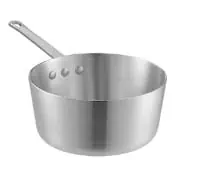
I find that anodized aluminum is a good choice when it comes to aluminum cookware. It’s created by using a process that makes a thicker and stronger layer on the aluminum surface. This means that it won’t leach into my food while I cook, which is a huge plus. America’s Test Kitchen states that if you’re concerned, you may wish to cook in aluminum that has been anodized or clad in a nonreactive material. Most of the aluminum cookware on the market today is either anodized or has a nonstick coating.
Stainless Steel
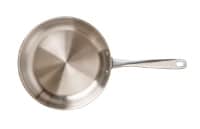
Another option I like is stainless steel. It’s known for its durability and even heat distribution. One of the best things about stainless steel is that it doesn’t react with food, making it a safe choice. It’s also easy to clean and maintain its shine, which is a plus in my kitchen.
Cast Iron
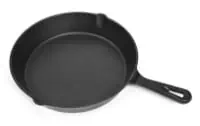
Cast iron cookware is a classic choice for many reasons. First, it has great heat retention, carrying over the heat for an even cooking experience. When I season my cast iron pan properly, it develops a nonstick surface, making it great for any kitchen! The downside is it’s heavy, but a great workout!
Carbon Steel
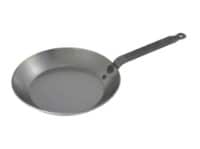
I also like using carbon steel cookware because it shares many great features with cast iron. It heats up quickly and has a lighter-weight design. After seasoning, a carbon steel pan is just as nonstick as cast iron. Keep in mind, though, like cast iron, it requires some care to maintain its seasoning.
Ceramic
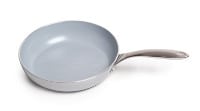
If you’re looking for an eco-friendly cookware material, ceramic is the way to go. It’s made from clay and is free of any metals. Additionally, ceramic cookware has a naturally nonstick surface, which means I don’t need to use as much oil when I cook. This is a great alternative for those seeking a healthier and safer cooking experience.
Related: Our Cookware Buying Guide. How To Find Your Perfect Set.
Frequently Asked Questions
Is nonstick cookware safe to use?
Nonstick cookware is generally safe to use, but there are some concerns about the potential health risks associated with the chemicals used to make the nonstick coating (PFAS, PTFE, cadmium, and lead). It’s a good idea to avoid overheating nonstick cookware, avoid the dishwasher, and only use wooden or silicone utensils that won’t scratch the coating.
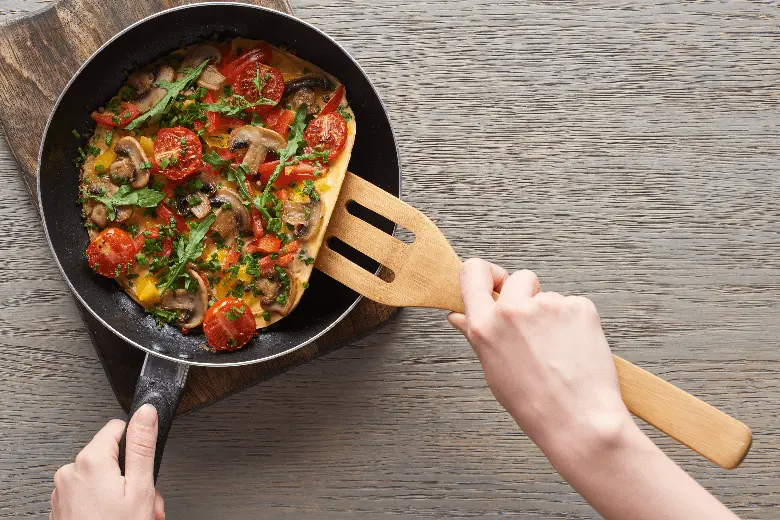
What is the safest material for cookware?
There is no one “safest” material for cookware, as each type of material has its own benefits and potential drawbacks. Some of the materials that are commonly considered to be safe include stainless steel, cast iron, and ceramic.
Can using aluminum cookware cause Alzheimer’s disease?
There is no conclusive evidence to suggest that using aluminum cookware can cause Alzheimer’s disease. While some studies have suggested a link between aluminum exposure and Alzheimer’s, others have found no such link.
Is it safe to use scratched or damaged cookware?
Scratched or damaged cookware can be unsafe to use, as it can allow potentially harmful substances to leach into your food. It’s a good idea to replace any cookware that is scratched or damaged.
How can I care for my cookware to ensure its longevity and safety?
To care for your cookware, it’s important to follow the manufacturer’s instructions for use and care. This may include avoiding harsh detergents or abrasive cleaners, seasoning cast iron or carbon steel cookware regularly, and storing your cookware properly. Additionally, it’s a good idea to inspect your cookware regularly for signs of damage or wear.
Conclusion: Is Aluminum Cookware Bad?
In this article, we’ve explored the safety of aluminum cookware. While lightweight and affordable, it has some drawbacks. For example, it can react with acidic foods and may leach small amounts of aluminum into the food we eat. Some experts link high levels of aluminum with Alzheimer’s disease.
That said, the consensus among scientists is that the risk is low. Only a tiny fraction of aluminum from cookware ends up in our bodies. In fact, the ATSDR states that we absorb just 0.01 to 5 percent of the aluminum we ingest. So, is aluminum cookware bad? It depends on your needs and preferences.
If you’re worried about aluminum cookware, my first recommendation is moderation: don’t use it for cooking acidic foods, or don’t use it every day. Next, you could also switch to coated aluminum cookware, which has a protective layer to reduce any risks (which is most of the available cookware). Finally, consider other cookware materials like stainless steel or cast iron if you want to avoid aluminum altogether.
In the end, whether you use aluminum cookware or not is a personal choice. That decision depends on your own health concerns and cooking preferences. I believe it’s key to find a balance so you can enjoy the benefits while minimizing potential risks. Happy cooking!
